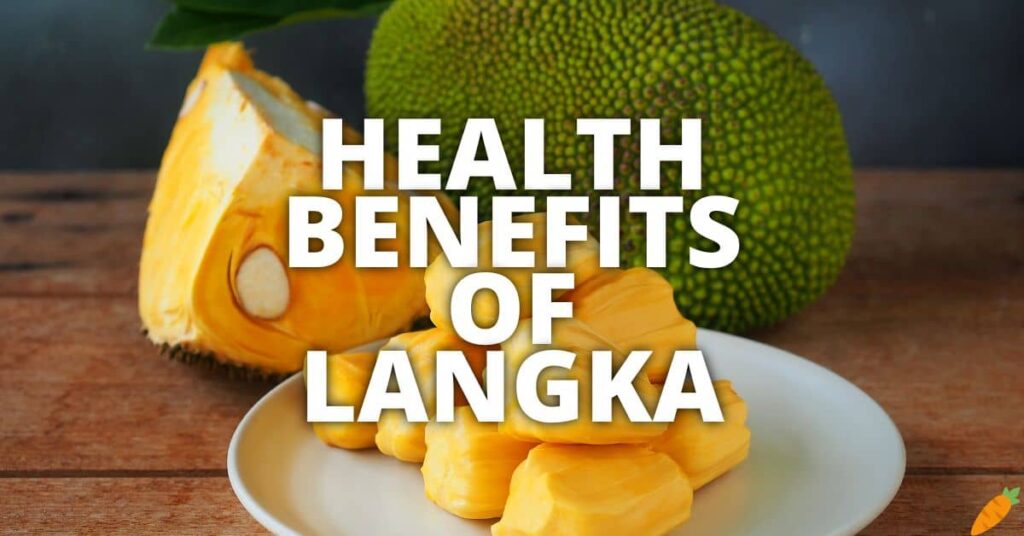Langka, or jackfruit, is a tropical fruit known for its unique taste and texture.
It’s widely enjoyed in different parts of the world, but its true value extends beyond flavor.
Langka is rich in vitamins, minerals, and plant compounds that may contribute to various aspects of health.
Adding langka to your diet can provide numerous benefits, supporting everything from your immune system to your heart.
We’ll cover the specific health benefits of langka and explain how it can play a role in your overall wellness.
1. Nutrient-Dense Profile: What Langka Brings to Your Diet
Langka is loaded with essential nutrients, making it a beneficial addition to your daily meals.
This fruit contains high levels of vitamin C, potassium, and several types of B vitamins, which are essential for many bodily functions.
Additionally, langka is a good source of dietary fiber and has small amounts of protein, making it more filling than other fruits.
Its nutrient density supports energy production, immune health, and even muscle function.
Consuming langka regularly can be a simple way to boost your intake of vital nutrients.
📙 Potential Health Benefits of Atis
2. Rich in Antioxidants: How Langka Helps Combat Oxidative Stress
Langka contains various antioxidants, including flavonoids and carotenoids, which help protect the body from cell damage.
These antioxidants neutralize free radicals—unstable molecules that can lead to chronic diseases like cancer and heart disease if they accumulate.
By reducing oxidative stress, langka may play a role in protecting cells and maintaining their function.
The carotenoids in langka also support eye health, as they can reduce the risk of age-related eye conditions.
Including langka in your diet can contribute to healthier aging and reduce disease risks associated with oxidative damage.
📙 Potential Health Benefits of Kamias
3. Boosting Immunity: The Role of Vitamin C in Langka
Vitamin C is a key component of langka, and it has a direct impact on immune function.
This vitamin is necessary for the production of white blood cells, which help fight infections and keep illnesses at bay.
Langka’s vitamin C content supports faster wound healing, as it plays a role in collagen formation, an essential protein for skin repair.
Also, vitamin C acts as an antioxidant, offering extra protection against cell damage.
Consuming langka can strengthen your immune system and help your body respond better to infections.
📙 Potential Health Benefits of Abiu
4. Digestive Health: The Fiber Benefits of Langka
Langka is a high-fiber fruit, which is beneficial for maintaining healthy digestion.
Fiber helps add bulk to stool, making bowel movements easier and reducing the chances of constipation.
This can support regular digestive function and may help prevent digestive disorders like diverticulosis.
Moreover, fiber feeds beneficial bacteria in the gut, promoting a healthy gut microbiome.
Including langka in your diet may improve digestive comfort and overall gut health.
📙 Potential Health Benefits of Bignay

5. Blood Sugar Regulation: Langka’s Impact on Glycemic Control
Despite its natural sweetness, langka’s fiber content can help manage blood sugar levels.
Fiber slows down the absorption of sugars in the body, which prevents sudden spikes in blood glucose levels after eating.
This can be especially beneficial for people with insulin resistance or diabetes who need to monitor their blood sugar closely.
Langka also has a low glycemic index, meaning it has a gentler effect on blood sugar compared to some other fruits.
Adding langka to a balanced diet may support more stable blood sugar levels.
📙 Potential Health Benefits of Duhat
6. Heart Health: Supporting Cardiovascular Wellness with Langka
Langka contains potassium, which is important for heart health as it helps regulate blood pressure by balancing sodium levels in the body.
This mineral helps to ease tension in blood vessels, which can reduce the risk of high blood pressure and related heart issues.
In addition, the antioxidants in langka, like flavonoids, help protect the heart by reducing oxidative damage.
A diet that includes potassium-rich foods like langka may support long-term cardiovascular health.
Regular consumption of langka could help keep blood pressure in check and promote better heart function.
📙 Potential Health Benefits Of Lanzones
7. Weight Management: How Langka Can Aid in Weight Control
Langka’s fiber content makes it a satisfying fruit that can support weight management efforts.
Fiber promotes a feeling of fullness, which can reduce the urge to snack between meals or overeat.
Furthermore, langka has relatively low calories for its volume, making it a good choice for those trying to control their calorie intake.
By adding langka to meals or enjoying it as a snack, you may find it easier to stick to portion control.
This can make langka a valuable addition for people aiming to maintain or achieve a healthy weight.
📙 Potential Health Benefits Of Shishito Peppers
8. Anti-Inflammatory Properties: Reducing Inflammation with Langka
Langka contains compounds with natural anti-inflammatory effects, which can help manage inflammation in the body.
Chronic inflammation is linked to several health issues, including arthritis, cardiovascular disease, and certain autoimmune conditions.
Some antioxidants in langka, such as flavonoids, work to reduce inflammation at the cellular level, potentially lessening the symptoms of inflammation-related disorders.
These compounds may also help ease minor aches and pains associated with everyday inflammation.
Regularly consuming langka could be beneficial for people seeking to manage or reduce inflammation.
📙 Potential Health Benefits of Different Fruits
9. Promoting Skin Health: The Beauty Benefits of Langka
The high vitamin C content in langka contributes to healthy, vibrant skin by supporting collagen production, an essential protein that maintains skin elasticity and strength.
Vitamin C also protects skin from oxidative stress, reducing signs of aging like wrinkles and fine lines.
Plus, the antioxidants in langka protect skin cells from environmental damage caused by pollution and sun exposure.
With regular consumption, langka may promote a clearer, healthier complexion.
This fruit’s nutrient profile makes it a beneficial food for maintaining youthful, resilient skin.
📙 Amazingly Beneficial Health Effects
10. Culinary Versatility: Creative Ways to Enjoy Langka
Langka is highly versatile and can be incorporated into both sweet and savory dishes, making it easy to add to your diet.
Its unique texture, when cooked, resembles pulled meat, making it a popular plant-based substitute in dishes like tacos and sandwiches.
Langka can also be eaten fresh, added to smoothies, or used in desserts, offering multiple ways to enjoy its flavor and benefits.
This flexibility allows you to experiment with langka in recipes that suit your tastes and dietary needs.
Trying different preparations of langka can keep your meals exciting while offering various health benefits.
💡 Conclusion
Incorporating langka into your diet can support many aspects of your health.
From boosting immunity to promoting skin health, langka’s wide array of nutrients makes it a valuable addition to daily meals.
Its potential benefits for digestion, heart health, and weight control highlight how versatile and impactful this fruit can be.
With so many ways to prepare and enjoy langka, it’s easy to make it a regular part of a balanced diet.
Embracing langka’s health benefits can be a delicious and effective step toward overall wellness.
⛑️ Safety First
While langka offers potential health benefits, some of these effects may be based on anecdotal evidence or theories rather than scientific studies.
People with allergies to latex or birch pollen should avoid langka, as it may trigger allergic reactions.
Those with medical conditions, such as diabetes or kidney issues, should consult a doctor before adding langka to their diet, as it may interact with their health needs.
It’s also wise to do personal research on these benefits and talk to a healthcare professional for personalized advice.
Always prioritize professional guidance when considering any dietary changes for health purposes.
⚠️ Content Disclaimer
This article is intended for informational and entertainment purposes only and should not be considered medical advice.
The potential health benefits mentioned are general in nature and may not apply to everyone.
Always consult a healthcare professional before making any changes to your diet, especially if you have pre-existing health conditions.
The information here is based on available knowledge and is not a substitute for expert medical guidance.
Readers are encouraged to use their discretion and seek personalized advice from qualified professionals.

